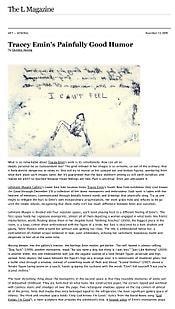
The L Magazine
November 13, 2009
Tracey Emin's Painfully Good Humor
By Deirdre Hering
What is so remarkable about Tracey Emin's work is its simultaneity. How can art so deeply personal be so transcendent too? The grief imbued in her images is so extreme, so out of the ordinary, that it feels almost dangerous to relate to. One will try to marvel at her splayed out and broken figures, wondering from what dark place such images came. But it's guaranteed that the least stubborn among us will catch ourselves and realize we aren't so touched because those feelings are new. Pain is universal; Emin just articulates it.
Lehmann Maupin Gallery's Lower East Side location hosts Tracey Emin's fourth New York exhibition Only God Knows I'm Good (through December 19) a collection of her latest monoprints and embroidery. Each work is laden with the heaviest of emotions, communicated through brutally honest words and drawings that physically sting. Try as one might to relegate the hurt to Emin's own extraordinary circumstances, her work grabs hold and refuses to let go until the viewer relents, recognizing that there really isn't too much difference between Emin and ourselves.
Lehmann Maupin is divided into four separate spaces, each room playing host to a different feeling of Emin's. The first space holds her signature monoprints, almost all of them depicting a woman engaged in what looks like frantic masturbation, words floating above them in her illegible hand. "Nothing Touches" (2009), the biggest piece in the room, is a large, cotton sheet embroidered with the figure of a bride. Her face is obscured by a dark shadow and gaudy, fabric flowers orbit around her without ever getting too close. The title is embroidered below her, a contradiction of childish scrawl rendered in neat, even embroidery, echoing her sentiment; hopelessly numb and desperate to feel all at the same time.
Moving deeper into the gallery's interior, the feelings Emin evokes get darker. The self-hatred is almost stifling. "Dog Fuck" (1999), another monoprint, reads "No you were a dog but thing is I was less." "Just Like Nothing" (2009) is another sheet, this one embroidered with just the vaguest outline of a lone female figure, prostrate and legs spread. Emin depicts the space between the figure's legs as a strange void; it is reminiscent of shattered glass, like a bullet shot through a window, instead of something made of flesh and blood. "Scared Shitless" (2007) shows a female figure laying prone on a couch, hands gripping the cushions with the words "Don't kid yourself Trace you're scared shitless."
The most disturbing thing about the monoprints in this second space is that they resemble memories of some sort of debauched childhood. They are furnished on what looks like construction paper, the corners ripped and wrinkled with careless stains and smudges all over the page. Two rectangular shadows appear on the top corners of almost all of the prints, hints that maybe they once belonged taped to the refrigerator, the most significant gallery space of infancy. The third and smallest space holds "Only God Knows I'm Good," (lyrics from the David Bowie song "God Knows I'm Good"), a neon sculpture that provides the exhibition's title. A looped video of Emin's monoprints plays on the blank wall opposite the sculpture.
But the exhibition is not all one, sad note. Patient viewers will discover more than just her confessions, but Emin herself, someone who is, if she is anything like her art, resilient, bold, and, rather unexpectedly, funny. It's almost inconceivable that she manages to crack a joke that doesn't feel out of place in as oppressive an atmosphere as this. But her irreverent humor is a welcome respite from the relentless emoting. These works, the ones that could be considered mundane when compared to the other monumental pieces, are actually the real jewels of the exhibition, adding another lighter and necessary dimension to her work.
"So Picaso" (Emin swears her misspellings are not affectations but genuine mistakes) is one such image, a small, easy-to-miss monoprint on the gallery's second floor. A female figure leans against the right side of the picture plane, knees bent, back arched. Her features are flattened and hard-edged; vaguely Cubist. The real joke is what's written in the center of the picture plane: "PicasO." Emin has said that she regards Picasso, the man some revere as the greatest painter of the 20th century, as nothing but a misogynist. Here she takes another shot at him, reducing him to something as fleeting and self-serving as an orgasm.
On November 7 Emin read passages from her biography Strangeland at University Settlement and further discussed her feelings about Picasso. When an audience member asked what she thought about him, she smiled and replied "someone wants me to tell the Picasso story." According to Emin, at another exhibition years ago someone asked her that same question, to which she replied, "fuck Picasso." When an angry attendee yelled, "Why? Why fuck Picasso?" she laughed and said, "I don't know but I wish I did."
The fourth and final space in the gallery is up a narrow flight of stars. A small, windowed room holds some of Emin's older prints including the aforementioned "So Picaso." From that room, a short hallway brings the viewer to a small balcony overlooking the gallery's entire first floor. "Some Crazy Fucked Up Dog Hell That's How It Feels To Live Without Love," another neon sculpture rendered in her hand buzzes quietly on the balcony wall. That final piece offers what comes closest to a peaceful interlude in an exhibition as visceral as Only God Knows I'm Good. If not a glimpse of hope, then it is at least a sign that Emin is not ready to live without love just yet, a message that hopefully brings as much comfort to her as it did to this viewer.
